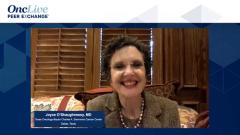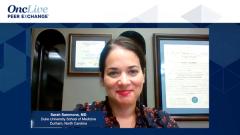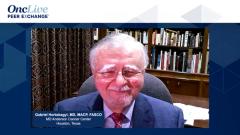
Treatment Advances in HR+/HER2- MBC
Final takeaways from a discussion on best practices treating HR+/HER2- metastatic breast cancer with CDK4/6 inhibitors and PI3K therapies based on data presented at ESMO 2021.
Episodes in this series

Joyce O’Shaughnessy, MD: This has been a lovely discussion. Really great talking to you. We covered the waterfront on a lot of these topics. Let’s go around—if you have 1 final thought you’d like to leave folks with. Neil, I’ll start with you. Anything you’d like to leave us with?
Neil M. Iyengar, MD: We’ve just brushed the surface in terms of where the field is going for hormone receptor–positive advanced disease. What’s most exciting is biologically speaking, we’ve all known for a long time that ER [estrogen receptor]–positive or hormone receptor–positive disease is a basket. It’s like triple-negative, perhaps a little more narrow, but it comprises several molecular subtypes. The challenge was translating that understanding into the clinic and acting upon it. We’re starting to do that, with not only next-generation sequencing but also understanding resistance mechanisms. Understanding how just watching the natural history can translate into categorizing the molecular subtype. Most importantly, having drugs, some of which are already available and many of which are coming down the pipeline, that we can match to our better understanding of the molecular biology of the breast cancer that we’re dealing with. What we’re seeing is a shift away from this sort of broad-basket treatment to a very precise approach to treating the subtypes of hormone receptor–positive breast cancer.
Joyce O’Shaughnessy, MD: So true. You see change, but there’s a lot more ahead. Hopefully, in our lifetimes we’ll see it all sorted out. How about you, Sarah?
Sarah Sammons, MD: The body of literature surrounding ribociclib has been interesting lately. I implore folks to take a look at those data before reflexing to prescribing palbociclib in the first line. We don’t have head-to-head trials, but we have a compound that, if offered in the first line, is leading to a median survival of over 5 years, and that survival benefit seems to consistently get better as the years go on. Also, CDK4/6 in the first line improves quality of life, prolongs survival, and prolongs time to chemotherapy. All considerations that CDKs should be used in the first line. The body of literature surrounding ribociclib is looking quite promising.
Joyce O’Shaughnessy, MD: Thanks, Sarah. How about you, Gabe? Have the last word for us.
Gabriel Hortobagyi, MD, MACP, FASCO: The first paper I wrote, in 1974, was about metastatic breast cancer. It showed a median survival of about 24 months. At that time, we didn’t know about subsets. In the intervening years, we haven’t shown, in any individual clinical trial, a prolongation of survival in the hormone receptor–positive population until we got to the CDK4/6 inhibitors. Yet the control arm of the MONALEESA-2 trial shows a median survival of 51 months, so we’ve made progress. We’ve made significant progress in those 3 to 3½ decades. Now we’ve broken the ceiling of 5 years. What we’ve discussed is that this is the first step, the first of many exciting paths we can take. I’m confident we’ll continue to make great progress in this, as in other types of breast cancer.
Joyce O’Shaughnessy, MD: Thank you so much. Thanks for your thoughts and for participating. It’s really great talking with you. I want to thank our viewing audience as well for participating. I hope this has been informative and interesting for you and will be helpful in your practice. Bye-bye.
Transcript edited for clarity.







































